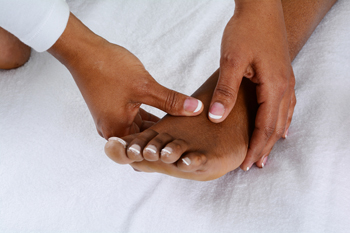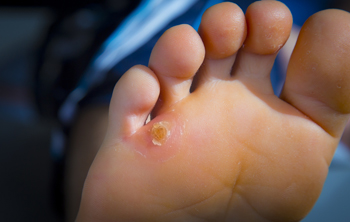 The foot condition that is known as hammertoe can cause severe pain and it may even make it difficult to wear shoes. It causes the middle toe to bend downward at the joint, which can push against the adjoining toes. A common occurrence of this condition can be from wearing shoes that do not have adequate room for the toes to move freely in. In severe cases, calluses and corns may form on top of the extended toe joints as a result of excess friction, and this can add to the discomfort of this foot ailment. Mild relief may be found when the affected toe is protected by a cushioned pad and this may alleviate a portion of the pressure as daily activities are performed. If you have developed hammertoe it is strongly advised that you seek the counsel of a podiatrist who can help to determine the best course of treatment for you, which may include surgery that can permanently straighten the toe.
The foot condition that is known as hammertoe can cause severe pain and it may even make it difficult to wear shoes. It causes the middle toe to bend downward at the joint, which can push against the adjoining toes. A common occurrence of this condition can be from wearing shoes that do not have adequate room for the toes to move freely in. In severe cases, calluses and corns may form on top of the extended toe joints as a result of excess friction, and this can add to the discomfort of this foot ailment. Mild relief may be found when the affected toe is protected by a cushioned pad and this may alleviate a portion of the pressure as daily activities are performed. If you have developed hammertoe it is strongly advised that you seek the counsel of a podiatrist who can help to determine the best course of treatment for you, which may include surgery that can permanently straighten the toe.
Hammertoe
Hammertoes can be a painful condition to live with. For more information, contact Brent Harwood, DPM from Southeast Podiatry. Our doctor will answer any of your foot- and ankle-related questions.
Hammertoe is a foot deformity that affects the joints of the second, third, fourth, or fifth toes of your feet. It is a painful foot condition in which these toes curl and arch up, which can often lead to pain when wearing footwear.
Symptoms
Causes
Genetics – People who are genetically predisposed to hammertoe are often more susceptible
Arthritis – Because arthritis affects the joints in your toes, further deformities stemming from arthritis can occur
Trauma – Direct trauma to the toes could potentially lead to hammertoe
Ill-fitting shoes – Undue pressure on the front of the toes from ill-fitting shoes can potentially lead to the development of hammertoe
Treatment
Orthotics – Custom made inserts can be used to help relieve pressure placed on the toes and therefore relieve some of the pain associated with it
Medications – Oral medications such as anti-inflammatories or NSAIDs could be used to treat the pain and inflammation hammertoes causes. Injections of corticosteroids are also sometimes used
Surgery – In more severe cases where the hammertoes have become more rigid, foot surgery is a potential option
If you have any questions please contact one of our offices located in Fairhope, Brewton, and Atmore, AL . We offer the newest diagnostic and treatment technologies for all your foot and ankle needs.
 Warts, which can grow throughout the body, are outgrowths on the skin that are caused by human papillomavirus (HPV). Warts can be very contagious, and they can spread through skin-to-skin contact or through sharing personal items. Plantar warts grow on the bottom of the feet and usually have tiny black dots in them. Generally, warts disappear over time, but it may take months for them to do so. While plantar warts are usually harmless, they can be very painful. There are a variety of treatment options for warts that are causing pain, including chemical treatments and lasers. Some podiatrists may even elect to surgically remove warts that have become a problem. If you are experiencing painful plantar warts, make sure to discuss with a podiatrist which treatment options may be right for you.
Warts, which can grow throughout the body, are outgrowths on the skin that are caused by human papillomavirus (HPV). Warts can be very contagious, and they can spread through skin-to-skin contact or through sharing personal items. Plantar warts grow on the bottom of the feet and usually have tiny black dots in them. Generally, warts disappear over time, but it may take months for them to do so. While plantar warts are usually harmless, they can be very painful. There are a variety of treatment options for warts that are causing pain, including chemical treatments and lasers. Some podiatrists may even elect to surgically remove warts that have become a problem. If you are experiencing painful plantar warts, make sure to discuss with a podiatrist which treatment options may be right for you.
Plantar warts can be very uncomfortable. If you need your feet checked, contact Brent Harwood, DPM from Southeast Podiatry. Our doctor will assist you with all of your foot care needs.
About Plantar Warts
Plantar warts are the result of HPV, or human papillomavirus, getting into open wounds on the feet. They are mostly found on the heels or balls of the feet.
While plantar warts are generally harmless, those experiencing excessive pain or those suffering from diabetes or a compromised immune system require immediate medical care. Plantar warts are easily diagnosed, usually through scraping off a bit of rough skin or by getting a biopsy.
Symptoms
Treatment
To help prevent developing plantar warts, avoid walking barefoot over abrasive surfaces that can cause cuts or wounds for HPV to get into. Avoiding direct contact with other warts, as well as not picking or rubbing existing warts, can help prevent the further spread of plantar warts. However, if you think you have developed plantar warts, speak to your podiatrist. He or she can diagnose the warts on your feet and recommend the appropriate treatment options.
If you have any questions please feel free to contact one of our offices located in Fairhope, Brewton, and Atmore, AL . We offer the newest diagnostic and treatment technologies for all your foot care needs.
Read more about All About Plantar Warts Many patients are affected by rheumatoid arthritis in the feet. Some of the symptoms that are associated with this condition can include severe joint pain, swelling, and the feet may feel stiff. Research has indicated that exercise may significantly contribute to managing a portion of the pain that could come from this ailment. It may be helpful to practice strength training, in addition to cycling. Patients may feel better when extra body weight is lost, as this is often helpful in reducing pressure on the feet and . Pain in the feet and may be indicative of rheumatoid arthritis. If you feel you may have developed this condition, please speak with a podiatrist as quickly as possible.
Many patients are affected by rheumatoid arthritis in the feet. Some of the symptoms that are associated with this condition can include severe joint pain, swelling, and the feet may feel stiff. Research has indicated that exercise may significantly contribute to managing a portion of the pain that could come from this ailment. It may be helpful to practice strength training, in addition to cycling. Patients may feel better when extra body weight is lost, as this is often helpful in reducing pressure on the feet and . Pain in the feet and may be indicative of rheumatoid arthritis. If you feel you may have developed this condition, please speak with a podiatrist as quickly as possible.
Because RA affects more than just your joints, including the joints in your feet and , it is important to seek early diagnosis from your podiatrist if you feel like the pain in your feet might be caused by RA. For more information, contact Brent Harwood, DPM of Southeast Podiatry. Our doctor will assist you with all of your podiatric concerns.
What Is Rheumatoid Arthritis?
Rheumatoid Arthritis (RA) is an autoimmune disorder in which the body’s own immune system attacks the membranes surrounding the joints. Inflammation of the lining and eventually the destruction of the joint’s cartilage and bone occur, causing severe pain and immobility.
Rheumatoid Arthritis of the Feet
Although RA usually attacks multiple bones and joints throughout the entire body, almost 90 percent of cases result in pain in the foot or area.
Symptoms
Diagnosis
Quick diagnosis of RA in the feet is important so that the podiatrist can treat the area effectively. Your doctor will ask you about your medical history, occupation, and lifestyle to determine the origin of the condition. Rheumatoid Factor tests help to determine if someone is affected by the disease.
If you have any questions please feel free to contact one of our offices located in Fairhope, Brewton, and Atmore, AL . We offer the newest diagnostic and treatment technologies for all your foot care needs.
Read more about Rheumatoid Arthritis in the Feet Corns, similar to calluses, are hardened layers of dead skin that typically appear in a small, ball-like shape. They can generally be found on the bottom of the feet and sides of the toes. Some patients have found them to be sensitive to the touch, often making it uncomfortable to wear shoes. The reasons why a patient may develop a corn may vary. Common risk factors include wearing shoes that are too tight for your feet, not wearing socks, and walking while barefoot. The causes previously listed all have one factor in common, excess friction that irritates the skin. The removal of a corn can be done by soaking and exfoliating the feet, followed by filing the corn with a pumice stone. For a safe removal process, please seek the professional care of a podiatrist.
Corns, similar to calluses, are hardened layers of dead skin that typically appear in a small, ball-like shape. They can generally be found on the bottom of the feet and sides of the toes. Some patients have found them to be sensitive to the touch, often making it uncomfortable to wear shoes. The reasons why a patient may develop a corn may vary. Common risk factors include wearing shoes that are too tight for your feet, not wearing socks, and walking while barefoot. The causes previously listed all have one factor in common, excess friction that irritates the skin. The removal of a corn can be done by soaking and exfoliating the feet, followed by filing the corn with a pumice stone. For a safe removal process, please seek the professional care of a podiatrist.
Corns can make walking very painful and should be treated immediately. If you have questions regarding your Feet, contact Brent Harwood, DPM of Southeast Podiatry. Our doctor will treat your foot care needs.
Corns: What Are They? And How Do You Get Rid of Them?
Corns are thickened areas on the skin that can become painful. They are caused by excessive pressure and friction on the skin. Corns press into the deeper layers of the skin and are usually round in shape.
Ways to Prevent Corns
There are many ways to get rid of painful corns such as:
Treating Corns
Although most corns slowly disappear when the friction or pressure stops, this isn’t always the case. Consult with your podiatrist to determine the best treatment option for your case of corns.
If you have any questions please feel free to contact one of our offices located in Fairhope, Brewton, and Atmore, AL . We offer the newest diagnostic and treatment technologies for all your foot care needs.
Read more about Corns and Calluses